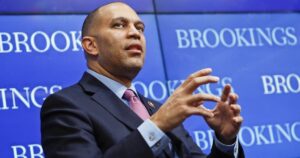Study Reveals Significant Pay Gap for H-1B Workers
New research has highlighted the significant pay disparities facing H-1B visa workers in the United States. Conducted by the Economic Policy Institute, the study found that foreign workers on H-1B visas often receive significantly lower wages than their American counterparts.
This discrepancy was particularly evident at companies such as HCL Technologies, where underpayment practices result in considerable financial benefits for firms raising concerns about the enforcement of labor standards.
H-1B visa workers are consistently paid far less compared to U.S. citizens performing similar roles, calling attention to wage theft issues and the need for improved oversight, Breitbart reported.
The Economic Policy Institute's research included extensive data from HCL Technologies, a prominent outsourcing firm. HCL Technologies counts industry giants like Microsoft, Disney, Boeing, FedEx, Google, T-Mobile, and Keurig Dr. Pepper among its clients.
Widespread Underpayment Across Industries
H-1B visa workers at HCL are reportedly paid up to 47% less than their American colleagues. This trend persists despite HCL's commitments outlined in visa applications to match or exceed the prevailing wage.
The study indicated that HCL systematically underpays H-1B workers across various business sectors, rigorously monitoring discrepancies between these wages and those earned by U.S. citizens.
The disparity is notable, with U.S. workers receiving between 13% and 87% more in salaries than H-1B workers. This practice reportedly enables HCL to save approximately $95 million annually by compensating its foreign workforce less than promised.
Persistent Wage Discrepancies in Technology Firms
Beyond HCL Technologies, the study also highlighted wage discrepancies at other companies, with Deloitte noted for paying H-1B visa holders about 10% less than U.S. citizens in equivalent positions.
The problem of underpayment and labor exploitation through the H-1B program is not new, having a history of impacting American professionals adversely. Previous reports have cited incidents of American layoffs and the training of foreign replacements, spotlighting workforce displacement concerns.
Tech Industry's High Dependence on H-1B Workers
In 2018, an analysis revealed that a significant portion of the tech workforce in Silicon Valley was foreign-born, with foreign nationals making up 71% of tech workers. In particular, the San Francisco area emerged as heavily reliant on foreign labor, with 50% of tech employees being foreign-born.
Furthermore, the reliance on Indian workers is particularly striking, as nearly 99% of H-1B employees recruited by the top outsourcing companies originate from India.
Calls for Improved Enforcement and Oversight
Researchers have drawn attention to what they describe as "white-collar wage theft on a grand scale." They argue that this massive discrepancy has been perpetuated by inadequate labor standards enforcement within the H-1B program. Efforts to rectify these persistent wage gaps are seen as crucial to ensuring fair treatment for all employees, regardless of their visa status.
The research sheds light on the systemic issues within the H-1B program and emphasizes the necessity for stringent oversight and enforcement of existing labor laws.
Such changes could potentially address the perceived exploitation of foreign workers and restore equitable wage practices across industries reliant on H-1B visas.




